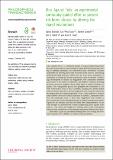Mice Against Ticks: an experimental community-guided effort to prevent tick-borne disease by altering the shared environment
Author(s)
Buchthal, Joanna; Evans, Sam Weiss; Lunshof, Jeantine; Telford, Sam R.; Esvelt, Kevin Michael
DownloadPublished version (899.6Kb)
Terms of use
Metadata
Show full item recordAbstract
Mice Against Ticks is a community-guided ecological engineering project that aims to prevent tick-borne disease by using CRISPR-based genome editing to heritably immunize the white-footed mice (Peromyscus leucopus) responsible for infecting many ticks in eastern North America. Introducing antibody-encoding resistance alleles into the local mouse population is anticipated to disrupt the disease transmission cycle for decades. Technology development is shaped by engagement with community members and visitors to the islands of Nantucket and Martha's Vineyard, including decisions at project inception about which types of disease resistance to pursue. This engagement process has prompted the researchers to use only white-footed mouse DNA if possible, meaning the current project will not involve gene drive. Instead, engineered mice would be released in the spring when the natural population is low, a plan unlikely to increase total numbers above the normal maximum in autumn. Community members are continually asked to share their suggestions and concerns, a process that has already identified potential ecological consequences unanticipated by the research team that will likely affect implementation. As an early example of CRISPR-based ecological engineering, Mice Against Ticks aims to start small and simple by working with island communities whose mouse populations can be lastingly immunized without gene drive. This article is part of a discussion meeting issue 'The ecology and evolution of prokaryotic CRISPR-Cas adaptive immune systems'.
Date issued
2019-03Department
Massachusetts Institute of Technology. Media LaboratoryJournal
Philosophical Transactions of the Royal Society B
Publisher
The Royal Society
Citation
Buchthal, Joanna et al. "Mice Against Ticks: an experimental community-guided effort to prevent tick-borne disease by altering the shared environment." Philosophical Transactions of the Royal Society B 374, 1772 (May 2019): 20180105. © 2019 The Authors
Version: Final published version
ISSN
0962-8436
1471-2970